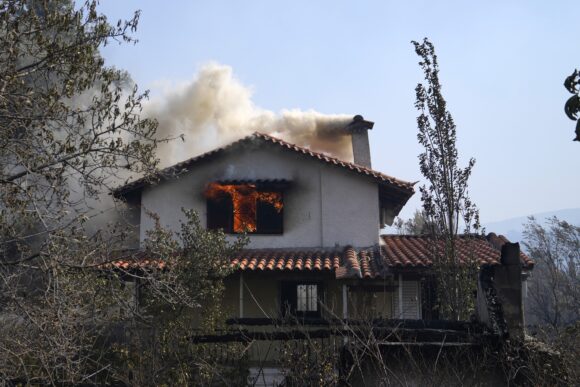ATHENS, Greece (AP) — Despite strong winds, firefighting aircraft and ground forces in Greece gained the upper hand late Monday over two new blazes that broke out in areas already scarred by major wildfires this summer.
The first broke out Monday morning in the southern part of Evia, Greece’s second-largest island, whose north was devastated earlier this month by a blaze that burned for more than 10 days. The second wildfire erupted in Kaza, in the Vilia area northwest of Athens where a major blaze was brought under control Friday after burning for five days.
The fire service said late Monday the Kaza blaze was on the wane and the fire on Evia was contained.
Earlier, authorities had issued an evacuation order for Vilia, 60 kilometers (37 miles) from the Greek capital. Some residents hosed down their gardens and homes, hoping to save them, while police halted traffic on a nearby highway. At least half a dozen buildings were severely damaged in the area.
The fire department sent 167 firefighters as well as 60 vehicles, 14 helicopters and 14 aircraft to fight the flames.
This month, which began with Greece’s most severe heat wave in about three decades, is quickly turning into one of the country’s most destructive fire seasons, with dozens of wildfires breaking out every day. Thousands of people have been forced to flee the flames, which have devoured forests, agricultural land, homes and businesses.
But Greece’s focus on preemptive evacuations of inhabited areas has helped keep people safe. Across all the fires, one volunteer firefighter was killed and two firefighters suffered severe burns.
The causes of Greece’s wildfires haven’t yet been officially established, but more than a dozen people have been arrested on suspicion of arson. A special prosecutor for organized crime was involved in the investigation.
Intense heat and wildfires have struck other Mediterranean countries. Recent wildfires have killed at least 75 people in Algeria and 16 in Turkey, while in southern France 1,200 firefighters have been struggling to contain a major blaze that has forced thousands to flee, killed two people and injured 26 others.
Worsening drought and heat have also fueled wildfires in the western United States and in Russia’s northern Siberia region.
Scientists say there’s little doubt that climate change from the burning of coal, oil and natural gas is driving more extreme events.
–Nicholas Paphitis in Athens contributed.
About the photo: A house is on fire in Vilia area some 60 kilometers (37 miles) northwest of Athens, Greece, Monday, Aug. 23, 2021. Greece’s fire department scrambled firefighting aircraft and ground forces as at least two new blazes broke out in areas already scarred by wildfires this summer, with strong winds complicating efforts to contain them. (AP Photo/Thanassis Stavrakis)
Was this article valuable?
Here are more articles you may enjoy.


 Canceled FEMA Review Council Vote Leaves Flood Insurance Reforms in Limbo
Canceled FEMA Review Council Vote Leaves Flood Insurance Reforms in Limbo  These Five Technologies Increase The Risk of Cyber Claims
These Five Technologies Increase The Risk of Cyber Claims  FM Using AI to Elevate Claims to Deliver More Than Just Cost Savings
FM Using AI to Elevate Claims to Deliver More Than Just Cost Savings  US Will Test Infant Formula to See If Botulism Is Wider Risk
US Will Test Infant Formula to See If Botulism Is Wider Risk 